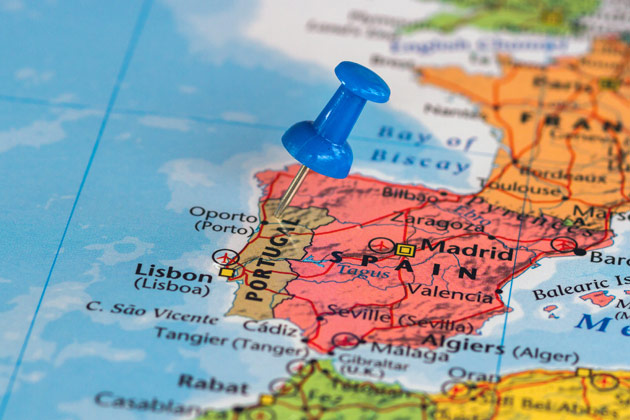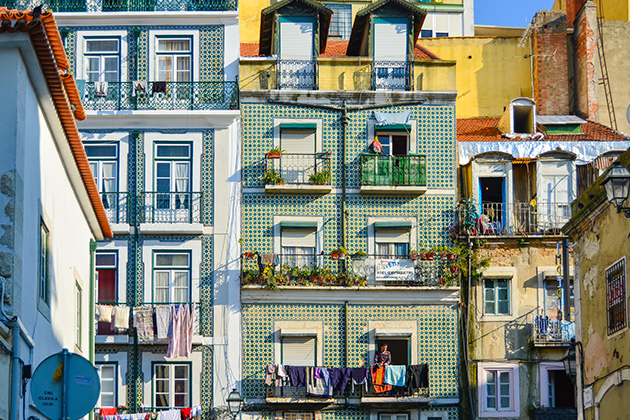
What is it like living in Portugal without speaking Portuguese? If you’re thinking of moving country then you might be worried about not being able to speak a single word of the language. On the surface the Portuguese language has very complex rules and difficult pronunciations.
But these concerns are unfounded. Follow our tips to live in Portugal without speaking Portuguese and learn how to communicate in everyday life. Without having to spend all your nights studying grammar.
It is important to know how to speak a little Portuguese
The first words you need are easy to memorize: “Obrigado/a” (thank you), “por favor”, (please) and “Quero um café” (I would like a coffee). From there though the learning curve gets a little bit steeper.
Happily you can rely on the help of the Portuguese. They are used to hosting foreigners and living abroad. Due to the paucity of Portuguese speakers in Europe, they accept that they are the ones who will probably have to adapt to your language to make themselves understood.
Portuguese is also an easier language than it seems. The pronunciation is the complicating factor. With a little persistence you’ll be able to read and speak properly.
Learning to speak Portuguese can be a challenge, but it has many advantages. You will begin to understand what you are told without having to ask for a translation. When you are choosing a phone package or negotiating the cost of renting a car you won’t have to put your blind faith in the people you’re dealing with. You’ll also avoid the having to hire someone to help you.
Essential words for living in Portugal without speaking Portuguese
Until you have a good command of the language use our list of words to start speaking Portuguese. You’ll feel more integrated and the people you talk to will appreciate your effort.
Obrigado (Merci, thank you)
When you want to thank someone. Never use the Spanish “Gracias” instead. Some people take it badly.
Por favor (Please)
It’s the best way to get someone’s attention.
Chamo-me … (My name is …)
Knowing the name of the person you’re talking to is always a good way to start a conversation.
Olá (Hello)
It’s the most common greeting in Portugal, but you might want to have some intimacy with the person you’re talking with before using it.
Bom dia (Good morning)
Greeting used in the morning (before lunch).
Boa tarde (Good afternoon)
Afternoon greeting (between lunch and dinner).
Boa noite (Good evening)
Greeting used in the evening (after dinner).
Ontem (Yesterday)
Hoje (Today)
Amanhã (Tomorrow)
Esquerda (Left)
The side of the heart.
Direita (Right)
The side that’s not the left.
Sim (Yes)
Não (No)
Não percebi (I didn’t understand)
It is better to say when you don’t understand to avoid any misunderstandings.
Mais devegar (Slower)
When you need someone to talk slower. You can supplement the phrase with “por favor”.
Muito gosto (Pleased to meet you)
To be used after people introduce themselves.
Não falo português (I do not speak Portuguese)
This will only be a temporary expression because you will definitely be able to speak Portuguese in no time at all, but this way the person you’re speaking to will be able to tell you’re a learner.
Tips to make living in Portugal without speaking Portuguese a thing of the past
1 – Watch movies and series
In Portugal, all films and series are subtitled. It is a good opportunity to understand how to write a few words and their corresponding meanings.
2 – Read packaging labels
Do you want to know how they say the name of a fruit? Buy some yogurt and read the labels. The idea is much less absurd than it seems. The packaging of the products you buy contains a lot of information and many important words.
3 – Books and magazines
It’s an obvious but effective suggestion. Buy Portuguese newspapers and magazines. You may not understand everything at first, but you will be able to learn new words and gain a connection with the Portuguese culture.
4 – Podcasts and radio
The radio is a powerful medium for understanding the cadence and rhythm of Portuguese as spoken by Portuguese people. Gradually you will internalize it as it is spoken.
5 – Mobile phone menu settings
Try changing your phone’s menu to Portuguese. Make sure you don’t lose your important messages and contacts. After you’ll see that you’re able to understand yourself in the midst of a maze of words in Portuguese.
6 – News channels
Try watching the news in Portuguese. In addition to getting to know more about Portuguese culture, you’ll learn how to pronounce names and places.
7 – Talk in cafés
Don’t be shy. Try ordering in Portuguese. In general, employees will try to understand you and help you out. Firstly because they’re nice. Secondly, because they want to make a sale!



